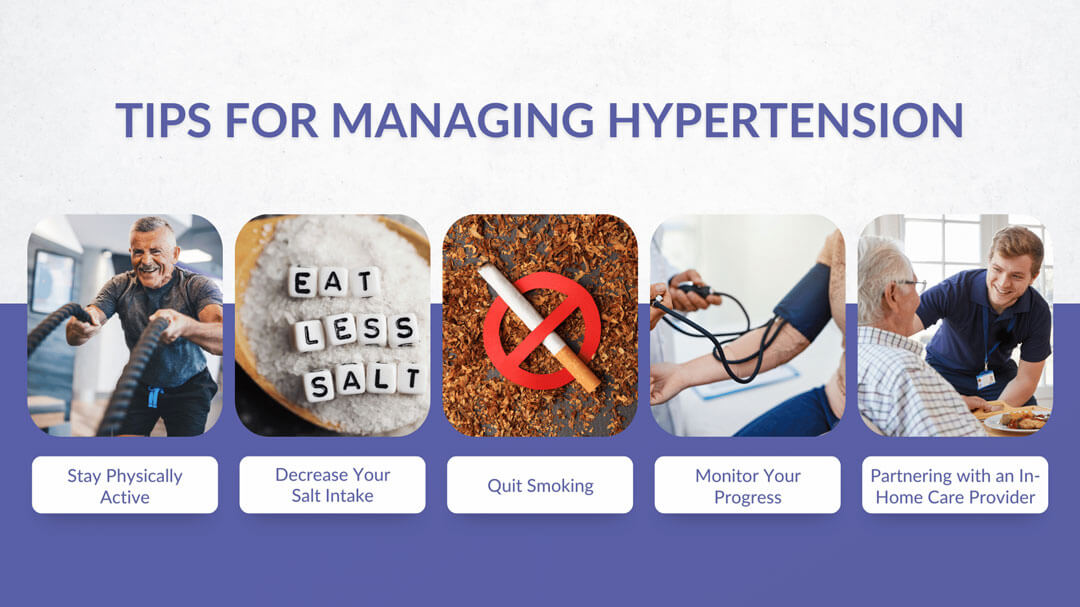Heart Health: Tips for Managing Hypertension

Your heart is essential to your overall health, especially as you age. One thing that can mess with your heart health is high blood pressure, also known as hypertension. If you have high blood pressure, your blood is pushing too hard against your blood vessels. Over time, this can damage your arteries and stress out your heart, leading to severe issues like heart attacks, strokes, heart disease, kidney problems, and even vision loss.
A lot of seniors don’t even realize they have high blood pressure because there aren’t any apparent symptoms. It’s usually found by regularly checking your blood pressure. If your readings are consistently 130/80 or higher, you might have hypertension.
While meds are often used to manage blood pressure, making some lifestyle changes can also really help keep it in check.
Table of Contents
Understanding Hypertension and Its Causes

Hypertension, or high blood pressure, occurs when the force of your blood against your artery walls is consistently too high. This condition can be caused by various factors, including a high-sodium diet, lack of physical activity, being overweight, smoking, excessive alcohol consumption, and chronic stress. Genetics and age also play a role. Understanding these causes can help you take proactive steps to manage your blood pressure effectively.
You must check your blood pressure periodically throughout the day to see if it remains high or stays within your target range. Note what you’re doing when you check it, whether you’ve just been exercising, sleeping, or feeling stressed. Tracking these trends can help you see if your lifestyle changes are making a difference. Be sure to share these notes with your doctor.
Tips for Managing Hypertension

Managing hypertension involves making lifestyle changes that can significantly improve your health. By incorporating these tips into your daily routine, you can help keep your blood pressure in check and reduce your risk of related health issues.
Stay Physically Active
As a general rule, aim for at least 30 minutes of moderate activity five days a week. You don’t have to stick to just one type of exercise, either. Mix it up to find what you enjoy so that working out doesn’t feel like a chore. Go for a walk or jog with friends, spend time biking or swimming, sign up for a dance class, or join a senior fitness program. Keep your body moving with a combination of cardio and strength training.
Regular exercise can also help you manage your weight, which is essential for reducing high blood pressure. Losing even a few pounds can lessen the strain on your heart and blood vessels. Be sure to talk to your doctor about their recommendations for exercise and weight management.
Decrease Your Salt Intake
Salt can be a significant contributor to high blood pressure, and you might be consuming more than you realize. Ideally, your sodium intake should be around 1,500 mg or less per day. Make sure to read the labels and serving sizes of the foods you eat. Processed and packaged foods usually have more sodium than fresh ones. When buying canned products, look for options labeled no salt added, unsalted, or low sodium.
Create a well-balanced diet with plenty of fresh or flash-frozen fruits and vegetables, lean meats, and whole grains. Instead of using salt for flavor, try adding a variety of herbs, spices, and other salt-free seasonings.
Quit Smoking
Quitting smoking can be challenging, but it’s worth it for your health. Nicotine constricts your blood vessels, reducing blood flow and making your heart work harder. It also increases the risk of plaque buildup in your arteries. Combined with high blood pressure, this can significantly raise your risk of a stroke or heart attack.
Monitor Your Blood Pressure
Check your blood pressure periodically throughout the day to see if it remains high or stays within your target range. Note what you’re doing when you check it, whether you’ve just been exercising, sleeping, or feeling stressed. Tracking these trends can help you see if your lifestyle changes are making a difference. Be sure to share these notes with your doctor. Partnering with an in-home care provider can help you better manage your heart health. A caregiver can remind you to take your blood pressure medication, help you create a low-sodium diet and prepare meals, and encourage you to stay physically active. Plus, they can be an excellent companion to talk to who can provide support as you navigate these changes. Contact Always Best Care of Birmingham at (659) 200-5714 to learn more and schedule your free consultation.





